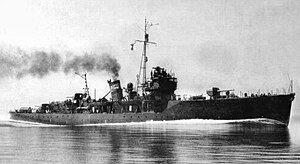Shimushu-class escort ship
 Shimushu 1940
| |
| Class overview | |
|---|---|
| Operators | |
| Succeeded by | Template:Sclass- |
| Built | 1939–1941 |
| In commission | 1940–1948 |
| Completed | 4 |
| Lost | 1 |
| General characteristics | |
| Type | Escort vessel |
| Displacement | 860 long tons (874 t) standard |
| Length | 77.7 m (255 ft) |
| Beam | 9.1 m (29 ft 10 in) |
| Draught | 3.05 m (10 ft) |
| Speed | 19.7 knots (22.7 mph; 36.5 km/h) |
| Range | 6,017 mi (5,229 nmi) at 16 kn (18 mph; 30 km/h) Fuel: 150 tons |
| Complement | 150 |
| Armament |
|
The Shimushu-class escort ships (占守型海防艦, Shimushu-gata kaibōkan) were a quartet of ships built for the Imperial Japanese Navy just prior to World War II.
Background and description
The Japanese called these ships Kaibōkan, "ocean defence ships", (Kai = sea, ocean, Bo = defence, Kan = ship), to denote a multi-purpose vessel. They were initially intended for patrol and fishery protection, minesweeping and as convoy escorts. The ships measured 77.72 meters (255 ft 0 in) overall, with a beam of 9.1 meters (29 ft 10 in) and a draft of 3.05 meters (10 ft 0 in).[1] They displaced 870 metric tons (860 long tons) at standard load and 1,040 metric tons (1,020 long tons) at deep load. The ships had two diesel engines, each driving one propeller shaft, which were rated at a total of 4,200 brake horsepower (3,100 kW) for a speed of 19.7 knots (36.5 km/h; 22.7 mph). The ships had a range of 8,000 nautical miles (15,000 km; 9,200 mi) at a speed of 16 knots (30 km/h; 18 mph).[2]
The main armament of the Shimushu class consisted of three Type 3 120-millimeter (4.7 in) guns in single mounts, one superfiring pair aft and one mount forward of the superstructure. They were built with four Type 96 25-millimeter (1.0 in) anti-aircraft guns in two twin-gun mounts, but the total was increased to 15 guns by August 1943. A dozen depth charges were stowed aboard initially, but this was doubled in May 1942 when their minesweeping gear was removed.[2] The anti-submarine weaponry later rose to 60 depth charges with a Type 97 81-millimeter (3.2 in) trench mortar and six depth charge throwers.
Ships
- Shimushu (占守): Launched, 13 December 1939. Commissioned, 30 June 1940. Ceded to the Soviet Union, 5 July 1947. Decommissioned on May 16, 1959.
- Hachijo (八丈): Launched, 10 April 1940. Commissioned, 31 March 1941. Scrapped, 30 April 1948.
- Kunashiri (国後): Launched, 6 May 1940. Commissioned, 3 October 1940. Wrecked, 4 June 1946.
- Ishigaki (石垣): Launched, 14 September 1940. Commissioned, 15 February 1941. Torpedoed and sunk by submarine USS Herring on 31 May 1944.
Notes
References
- Chesneau, Roger, ed. (1980). Conway's All the World's Fighting Ships 1922–1946. Greenwich, UK: Conway Maritime Press. ISBN 0-85177-146-7.
- Jentschura, Hansgeorg; Jung, Dieter; Mickel, Peter (1977). Warships of the Imperial Japanese Navy, 1869–1945. Annapolis, Maryland: United States Naval Institute. ISBN 0-87021-893-X.
{{cite book}}: Unknown parameter|lastauthoramp=ignored (|name-list-style=suggested) (help)
